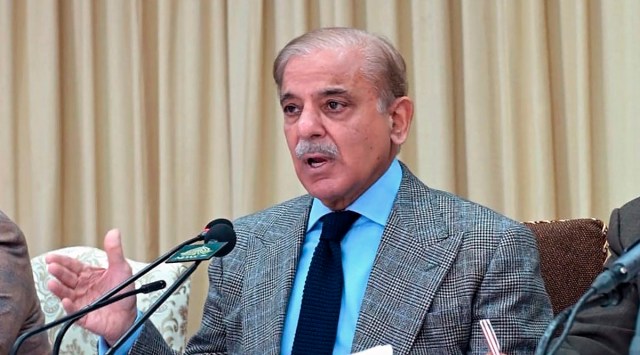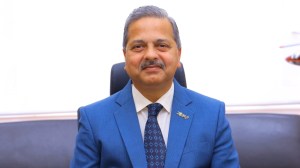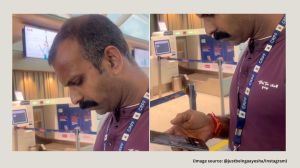Stay updated with the latest - Click here to follow us on Instagram
As Shehbaz Sharif calls for ‘sincere talks’ with Modi, a brief look at frosty Indo-Pak relations
Here's a quick look at the key events marking frosty relations between India and Pakistan.
 Pakistan Prime Minister Shahbaz Sharif speaks during press conference, in Islamabad. (AP)
Pakistan Prime Minister Shahbaz Sharif speaks during press conference, in Islamabad. (AP) Pakistan Prime Minister Shehbaz Sharif has said his country wanted a “sincere and serious” talks with his Indian counterpart Narendra Modi on “burning issues” like Kashmir.
In an interview with Dubai-based Al Arabiya TV on Monday, Sharif said that Pakistan has learned its lesson after three wars with India and stressed that now it wants peace with its neighbour. He also mentioned that he had asked Sheikh Mohamed bin Zayed, the President of the United Arab Emirates, to use his friendly ties with New Delhi to bring the two sides to the table to discuss all outstanding issues —Sharif mentioned the “human rights violations in Kashmir”, and India’s revocation of the special status of J&K.
Sharif’s remarks came at a time his country is battling severe economic distress, accentuated by disastrous floods, and a political crisis. The country saw the ouster of Prime Minister Imran Khan in April, who was replaced by self-exiled former premier Nawaz Sharif’s younger brother and PML-N president Shehbaz Sharif.
India has previously rejected any third-party mediation on the Kashmir issue, maintaining that it is a bilateral issue. New Delhi has also maintained that terrorism and talks cannot go together and Islamabad should provide a conducive atmosphere for resumption of dialogue.
Here’s a quick look at the key events marking frosty relations between both nations
Tensions over Kashmir
India and Pakistan have seen turbulent relations since the partition following Britain’s withdrawal in 1947. But Kashmir became a point of contention the same year, setting the stage for the first India-Pakistan war. It ended when a ceasefire was declared on the night of December 31, 1948, and the terms of the ceasefire were accepted on January 5, 1949.
The war between India and Pakistan over Kashmir in 1965 ended after ceasefire was brokered by the then Soviet Union. A third war was fought between the two countries in 1971 over East Pakistan, now called Bangladesh.
The countries also came to loggerheads during the 1999 Kargil war.
India, Pakistan flex nuclear muscles
India tested a nuclear explosive device for the first time in 1974, which then pushed Pakistan to speed up work on its own secret programme. Both countries, which publicly demonstrated their nuclear weapon capabilities in tit-for-tat tests in May 1998, hadn’t signed on to the Non-Proliferation Treaty (NPT).
The NPT, which took effect in 1970, is aimed at halting the spread of nuclear weapons-making capability and is signed by around 190 countries.
Both countries became the seventh and eighth in the world to possess nuclear weapons, essentially making South Asia a nuclear hotspot.
2001 Parliament attack
On December 13, 2001, five terrorists of the Pakistan-based militant groups Lashkar-e-Taiba and Jaish-e-Mohammed infiltrated the Parliament complex in a car with fake stickers of the Home Ministry. Nine people, including six Delhi cops and two Parliament security personnel, were killed and 18 were injured.
Four people — Mohammed Afzal Guru, Shaukat Hussain, Afsan Guru alias Navjot Sandhu, and SAR Geelani — were arrested in this connection. Later, the courts acquitted two of them, while Afzal was hanged in Delhi’s Tihar Jail in February 2013. Hussain served his sentence in jail.
BJP leader L K Advani and then home minister said in the Lok Sabha that the attack “was executed jointly by Pakistan-based and supported terrorist outfits, namely, Lashkar-e-Taiba and Jaish-e-Mohammad. These two organisations are known to derive their support and patronage from Pak ISI.”
26/11 Mumbai attacks
Ten terrorists of the Lashkar-e-Toiba sailed to Mumbai by boat from Karachi, landed near Colaba on November 26, 2008 entered the city late that evening, and shot their way to the Chhattrapati Shivaji railway Terminus, the Taj Hotel, the Oberoi, and the Chabad House Jewish centre. The city was under siege for more than three days during which the terrorists killed 164 people and injured scores.
The United Nations Security Council designated the Jamaat-ud-Dawa, the name that LeT had taken after it was banned in Pakistan in 2002, as a terrorist front group, with Hafiz Saeed as its leader.
Nine of the gunmen were killed in the counter-operation. Ajmal Kasab was the only terrorist who was captured alive. He was hanged four years later on November 21, 2012.
Pulwama attack
Relations between the two countries nosedived when 40 CRPF personnel were killed when their convoy was attacked in Jammu and Kashmir’s Pulwama district. Pakistan-based Jaish-e-Mohammed had claimed the responsibility of the attack. In response, India launched strikes on a JeM training camp in February 2019 in Pakistan’s Balakot.
Trade frozen, ties left in lurch since Article 370 abrogation
The ties between the two countries frayed further after the Narendra Modi-led government abrogated Article 370 of the Indian Constitution, revoking the special status of Jammu and Kashmir and bifurcating the State into two Union Territories on August 5, 2019.
India’s decision evoked sharp reactions from Pakistan, which downgraded diplomatic ties and expelled the Indian envoy. Trade relations between the neighbours have largely been frozen since then.







